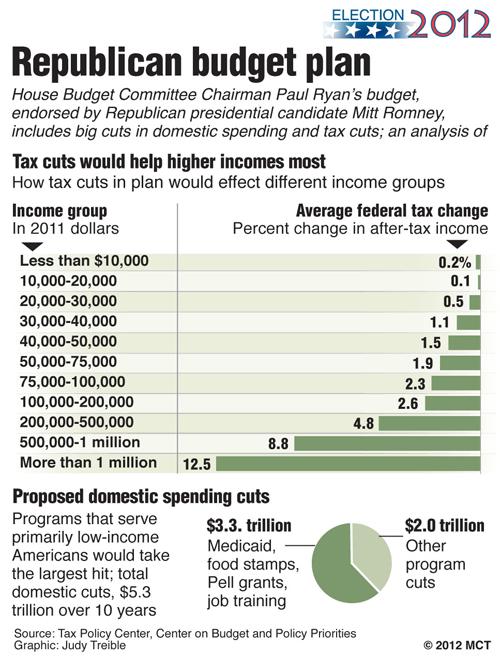
Last week, House Republicans passed Paul Ryan’s budget plan, which includes sharp decreases in domestic spending, as well as lower tax rates. Ryan’s budget restructured lower income programs like Medicaid, Pell grants and welfare programs with $3.3 trillion in spending cuts over 10 years. However, Ryan refused to reduce defense spending.
At this point, nearly everyone agrees that entitlement spending requires drastic restructuring. Medicaid and social security programs are unsustainable at current rates. In terms of dollars, the U.S. Social Security program is the largest government program in the world. However, Ryan’s budget plan cuts discretionary spending to a ridiculous extent.
Ryan’s bill, supported by the de facto Republican presidential nominee, Mitt Romney, would purportedly even out tax rates by removing tax breaks for the wealthy. But so far, not a single tax break has been eliminated in the budget.
As a result, the budget favors the rich even more. Not only do the ultra rich save more of their after-tax income, but government programs that help the poor are reduced. This is counterproductive. The income gap in America has climbed astronomically in the last decade.
In 2007, the Congressional Budget Office (CBO) found that, after taxes and income transfers, the lower 80 percent of American households earned less than half of the total American income. In 2011, the CBO reported that the top 1 percent of household incomes grew by 275 percent between 1979 and 2007.
I agree that the Obama administration has not made progress in reforming entitlement spending, but neither did the Bush or Clinton administrations. Entitlement spending reform is the most taxing part of our budget. Mandatory spending programs accounted for 56 percent of 2011’s federal budget. But their necessity and integration in our country makes entitlement reform a political landmine.
Our population is aging and healthcare costs are rising. With current demographic trends, Ryan’s entitlement spending cuts will severely impact the average American.
On the other hand, our defense budget is ripe for reduction. As we reduce our involvement in the Middle East, we can cut our defense budget without putting our country’s safety in jeopardy.
Historically, after wars, Congress has cut defense spending. Eisenhower cut the defense budget by 27 percent after the Korean War, and H.W. Bush cut defense spending by 20 percent after the Cold War.
There is no doubt that we need to reform our tax system and spending, but Ryan’s budget continues America’s trend of increasing income inequality. Furthermore, Ryan’s fanatic dedication to defense spending is as irrational as it is unsustainable. We do need to reform our government spending, but the recent budget cuts are unbalanced and unfair.
Paul is the opinion editor. He is a junior majoring in voice performance.












